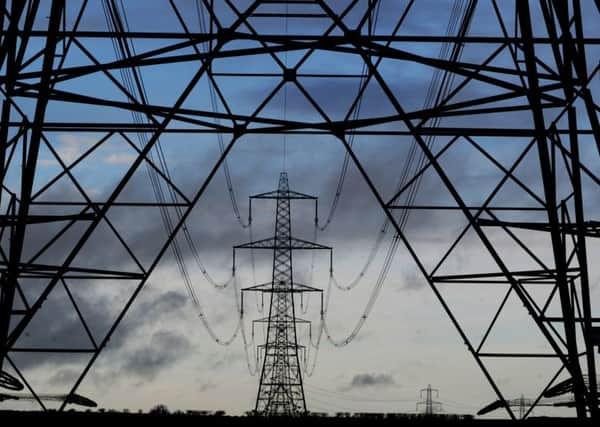Tony Lodge: If Britain doesn't build new power stations now, the lights will go out. Here's why


But chronic failures over a generation to get new ones built – as old ones closed – now means Britain is importing more and more electricity from Europe with plans to import up to a fifth of supplies by 2025. This is bad policy.
Britain’s electricity market is now increasingly slanted in favour of importing electricity and against securing investment in new power plants at home. Billions of pounds of energy plant investment are consequently at risk which will undermine future security of supply and risk price rises. Policy needs to change and energy security must become a top priority as we prepare to leave the EU.
Advertisement
Hide AdAdvertisement
Hide AdFirstly, it is important to understand our growing reliance on imported electricity, the plans to quadruple this dependency and the consequences for prices, competition and security of supply.
Our new Centre for Policy Studies paper, The Hidden Wiring, follows months of research and analysis into proposals for more undersea cables to import electricity, called interconnectors, and their negative impact on Britain’s electricity market and investment. We are calling for our findings to be urgently considered and examined by the competition authorities and Parliament.
Britain’s interconnector imports from Europe increased by 52 per cent in the three years to 2016, and they are set to surge as new interconnectors are planned. Back in 2012, imports were expected to account for just six terawatt hours (TWh) of supply per year in 2030. But four years later, the projection has radically changed. The 2016 forecast sees Britain’s electricity imports rising from 21 TWh today, to a peak of 77 TWh in 2025. That’s close to a fifth of supply.
Importing electricity, in principle, can have advantages – ranging from price to abundant availability – but this depends on a series of important factors.
Advertisement
Hide AdAdvertisement
Hide AdHowever, our research shows it is increasingly unlikely there will be much spare electricity in Europe to send to the UK going forward. It is ironic that it was Britain’s slavish adherence to EU directives which made us close many coal and oil fired power stations, such as Ferrybridge, before we had replacements ready and which has now resulted in a panic policy to import more electricity from Europe.
The truth is that Britain’s rising electricity imports are, in the short term, an easy way out for failed energy policies stretching back over a generation.
Back in 2012, David Cameron’s coalition government had the right plans for a new generation of gas-fired plants that would be easy to switch on and off to accommodate the sporadic nature of weather dependent renewable supplies.
It estimated that Britain would need 26GW of additional gas generation capacity by 2030 to plug any potential gap left by cloudy, windless days and to replace the electricity output from closing older coal, oil and nuclear plants. On current trends, however, the UK is on track to build just 12GW by 2030. This goes some way to explain the panic dash to build interconnectors.
Advertisement
Hide AdAdvertisement
Hide AdDeclining firm electricity capacity and supplies on the Continent are key to our conclusions. Both France and Germany are reducing their reliance on nuclear power (in Germany’s case, to zero by 2022) without any clear policy for replacements.
Coupled with this is EU policy to combat climate change and air pollution; it will accelerate the shutdown of firm generating capacity across the Continent. Europe still generates considerable electricity from coal and these plants are increasingly vulnerable to new legislation and political factors. The Netherlands is keen to close coal plants with plans for a new carbon tax.
Interconnectors enjoy a competitiveness boost from the fact that generators on the Continent don’t have to pay Britain’s high carbon price floor tax – unlike UK generators. This means they can undercut British generators, even if their power comes from dirty coal-fired capacity in the Netherlands or Germany. So instead of cutting carbon emissions, the UK is in some cases just offshoring it. Imports also don’t pay the transmission charges faced by UK generators.
Connected to this is the sham claim by National Grid that the UK is increasingly enjoying ‘coal free’ days – a PR wheeze based on the point that no UK coal plants are generating any electricity at a certain time.
Advertisement
Hide AdAdvertisement
Hide AdThe claim is flawed because the UK is increasingly importing electricity and National Grid cannot guarantee this electricity has not been generated from the many coal plants in Europe. The Minister for Energy recently confirmed in a Parliamentary written answer that it was impossible to trace the generation source of imported electricity.
All of this means that importing power is likely to get more challenging, erratic and expensive – not less. And yet the way in which Britain encourages and allocates access for imports to the electricity grid continues to discourage building new gas-fired plants here as they enjoy certain unfair market exemptions. It simply undermines the investment case.
Britain will need to become more competitive after Brexit and lower energy costs will be crucial as the Government’s new Industrial Strategy sets out. A key tool in achieving this will be through abundant, secure and stable electricity supplies. A dash to become more reliant on erratic imports is not the answer and Ministers should prioritise the building of new power stations at home and fast.